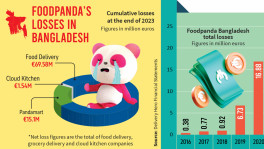New wave of famine could sweep the globe: UN officials
WFP Executive Director David Beasley warned famine was possible in up to three dozen countries and could overwhelm places already weakened by conflict

The global hunger crisis caused by conflict and compounded by Covid-19 pandemic is moving into a dangerous phase, the head of the UN World Food Programme (WFP) said.
WFP Executive Director David Beasley stressed that without resources, a wave of famine could sweep the globe, overwhelming nations already weakened by years of instability.
"This fight… is far, far, far from over," he said briefing the Security Council during a virtual debate on conflict-induced hunger Thursday.
Beasley recalled his April briefing to the 15-member Council where he warned that the world was on the verge of a hunger pandemic. Heeding the warning, donors and countries spent $17 trillion in fiscal stimulus packages, reports UN News.
The WFP and its partners were going all out to reach as many as 138 million people this year — "the biggest scale-up in our history," he said.
But more was needed to help "the 270 million people marching toward the brink of starvation." Already, 30 million rely solely on WFP for food to survive and will die without it, Beasley said.
He warned famine was possible in up to three dozen countries and could overwhelm places already weakened by conflict, reports AP.
"We're doing just about all we can do to stop the dam from bursting. But, without the resources we need, a wave of hunger and famine still threatens to sweep across the globe," he said.
Recalling Security Council resolution 2417 (2018) that called for effective early warning systems, Beasley said, "I'm here to sound that alarm ... the threat of famine is looming yet again."
2021 a 'make or break' year
Acknowledging that governments reserves are depleting, he said 2021 will be a make or break year. "I urge you: do not walk away from our commitment to humanitarian assistance. Do not turn your backs on the world's hungry."
He underscored the critical importance of balancing sensible measures to contain Covid-19 and reiterated that it is vital to guard against unintended consequences that can hit the poorest the hardest.
There are no more excuses for failing to act swiftly and decisively, he said.
Extreme poverty rising
UN Emergency Relief Coordinator Mark Lowcock said the human and economic cost of conflict is astronomical: an estimated 40 percent of gross domestic product (GDP) in the 10 most-affected countries.
While 135 million people faced acute food insecurity before Covid-19, that number is expected to almost double this year, to 270 million people. The World Bank expects the number of people in extreme poverty to rise for the first time since the 1990s.
The humanitarian system is doing its utmost but it is in danger of being overwhelmed by the scale of the needs. "That will get worse in the absence of a lot more financial help," he stressed.
Lowcock, also the UN Under-Secretary-General for Humanitarian Affairs, called for scaling up support for humanitarian operations.
Plea for scaled up support
Qu Dongyu, Director-General of the Food and Agricultural Organization (FAO), outlined countries and crisis situations where conflict and instability, now also exacerbated by Covid-19, are driving millions into more serious hunger and acute food insecurity.
"This is particularly visible in areas where conflict and other factors such as economic turbulence, and extreme weather, are already driving people into poverty and hunger," he said.
Globally, the hardest hit include the urban poor, informal workers and pastoral communities as well as people who are already vulnerable – children, women, the elderly, the sick, and persons with disabilities.
"We need first and fast aid to stop hunger," stressed Qu, adding that without prevention, political willingness and collective action, forecasts for food security continue to worsen.


 Keep updated, follow The Business Standard's Google news channel
Keep updated, follow The Business Standard's Google news channel
















